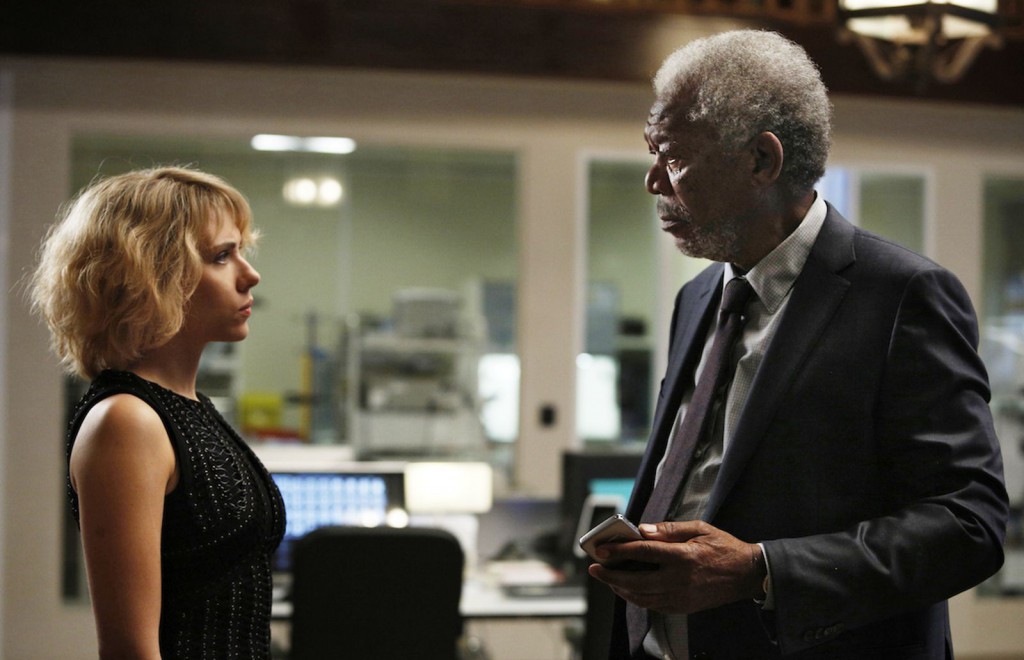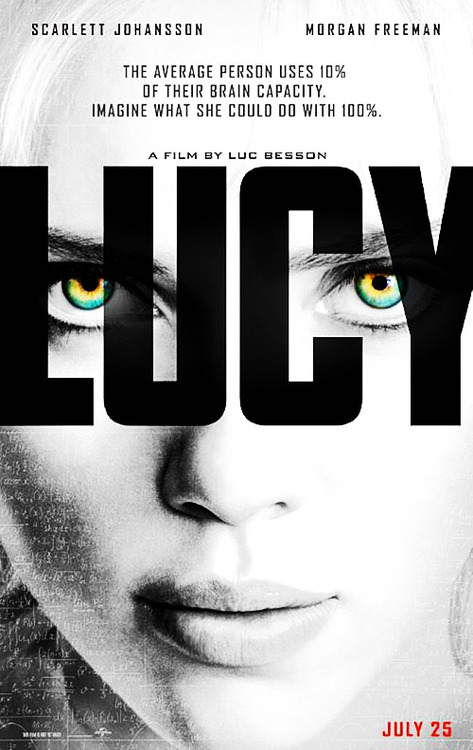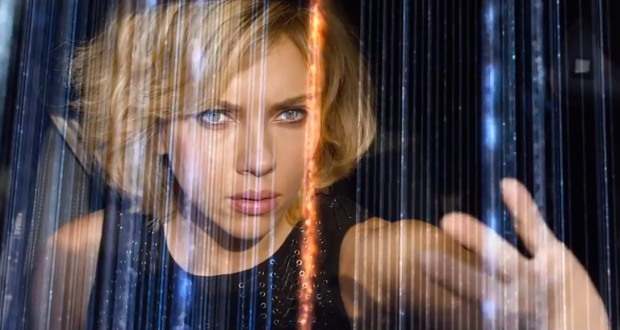Luc Besson has delivered a number of excellent films in his career, always excelling with action-packed romps. The Fifth Element, his 1997 action sci-fi film starring Bruce Willis and Milla Jovovich is still one of my all time favourite sci-fi films. So, when I heard that he was going back to a similar ‘feel’ for his next film, to say I was excited is a bit of an understatement. Combine Besson’s obvious talent for sci-fi with sci-fi’s latest pin-up girl, Scarlet Johansson and you potentially have something irresistible.
Plot
*Spoiler Free*
Lucy (Scarlet Johansson) is unwittingly caught up with a major drug trafficking ring out of Taipei led by Mr Jang (Min-sik Choi). She wakes up to find that they have operated on her, inserting a packet of an experimental new drug in her stomach, which she is to transport. When the bag begins to leak inside her, she absorbs the drug at an astonishing rate. Rather than killing her instantly, her brainpower is unlocked. Lucy rapidly gains access to parts of her brain only previously hypothesized about.
 Unsure what to do with all the knowledge she now possesses, Lucy reaches out to a professor of neuroscience (Morgan Freeman). He encourages her to further the biological imperative of all animal kind – to pass on knowledge. On the way to meeting Professor Norman, Lucy teams up with French detective Pierre Del Rio (Amr Waked) to hunt down the other victims of the drug syndicate and recover the drugs.
Unsure what to do with all the knowledge she now possesses, Lucy reaches out to a professor of neuroscience (Morgan Freeman). He encourages her to further the biological imperative of all animal kind – to pass on knowledge. On the way to meeting Professor Norman, Lucy teams up with French detective Pierre Del Rio (Amr Waked) to hunt down the other victims of the drug syndicate and recover the drugs.
Will Lucy manage to stay one step ahead of the drug syndicate? Will she be able to pass on her knowledge before they reach her? And what will happen when she reaches 100%?
High-concept science fiction
Most critics have been focusing on the premise (that humans only use 10-15% of their brain capacity), voicing their frustrations that a science fiction film is based on such an outdated concept. In an interview for The Guardian, Besson addresses this issue directly, arguing that movies are lies, everyone knows they are lies, so they simply have fun with ideas and explore them without professing to be truth. Therefore, does the premise really matter beyond what it allows the storyteller to do? Not only that, the film is really concerned with human potential, using this idea for illustrative, metaphorical purposes more than anything else.
 Besson also talks about having a film too heavily laden with philosophical ideas, and wanting there to be enough action and ‘fun’ to balance it out. Unfortunately for him, he doesn’t really achieve this (noble) goal in Lucy. I love high concept science fiction, but Besson is right when he acknowledges the need for enough of the ‘story’ elements beyond just the concept to keep the audience engaged and having fun.
Besson also talks about having a film too heavily laden with philosophical ideas, and wanting there to be enough action and ‘fun’ to balance it out. Unfortunately for him, he doesn’t really achieve this (noble) goal in Lucy. I love high concept science fiction, but Besson is right when he acknowledges the need for enough of the ‘story’ elements beyond just the concept to keep the audience engaged and having fun.
Lucy feels like it would have made a great sci-fi short story, but there’s simply not enough characterization, growth, or really anything for any of the characters to do but react to the extraordinary situation they find themselves in. And while many stories are ‘ordinary people in extraordinary situations’ (which Lucy is), the ordinary person needs to have some personal growth beyond the extraordinary situation to keep the audience interested.
What makes us human?
 As Lucy awakens to the world around her, she grows less human and more robotic with each percent of her brain she unlocks. Her story is the opposite of many ‘android’ tales, where the android endeavours to become more human, to engage with emotion instead of only being driven by logic (think Data from Star Trek: The Next Generation). With every incremental increase of brain capacity used, Lucy’s actions supposedly become more and more driven by biological imperatives – the greater good and all that. Instead of the traditional fear of knowledge, advancement, and science, the film is very much in favour of knowledge acquirement. As Lucy says in her disengaged, emotionless tone, ‘Ignorance brings chaos, not knowledge.’
As Lucy awakens to the world around her, she grows less human and more robotic with each percent of her brain she unlocks. Her story is the opposite of many ‘android’ tales, where the android endeavours to become more human, to engage with emotion instead of only being driven by logic (think Data from Star Trek: The Next Generation). With every incremental increase of brain capacity used, Lucy’s actions supposedly become more and more driven by biological imperatives – the greater good and all that. Instead of the traditional fear of knowledge, advancement, and science, the film is very much in favour of knowledge acquirement. As Lucy says in her disengaged, emotionless tone, ‘Ignorance brings chaos, not knowledge.’
As her knowledge grows, Lucy claims that what makes her human is quickly falling to the wayside – and what’s left? Well, what was there to begin with? What makes us human at all? The distinction that seems to be made in the film is that human nature is to be selfish, to use knowledge for personal gain only. Somehow, we have departed from the ordinary biological imperative that drives other animals, too consumed by materialistic pursuits.
The musical of science fiction films
Musicals often have so much singing and dancing that the plot and three-dimensional characters become secondary, or at least there’s not generally a whole lot of time left over to devote to a complex or very interesting plot/characters. Lucy has the same trouble, sort of. Looked at in one way, it is a very simple story of a girl who develops an extraordinary ability, trying to deal with it before her time runs out. Sounds simple enough, right? However, the film also tries to be a gangster action film. As well as high concept science fiction, encouraging the audience to ask themselves a lot of deep philosophical questions.
With all of these different plot threads running at the same time, it is difficult for Besson to devote enough time to any of them to make us really give a damn or build tension. Everything just keeps happening like some kind of deterministic universe, where nothing anyone does, not even Lucy, could make a difference. And that’s just not terribly interesting. Combine that with characters that are given little to no characterization, I have to ask, how are we supposed to care about them? Professor Norman has little threat to his own self. Lucy doesn’t seem bothered with preserving herself, so it is difficult to root for her (especially when it doesn’t seem like any human threat could actually pose a problem for her). Really, it is only Del Rio we might care about, but he is introduced so late in the game and given so little personality it is nowhere near enough to keep us hooked.
Verdict: Action-packed and full of interesting science fiction concepts. But this is not a film that you go to for plot or deep characters. Disappointing sci-fi from a previous master of the genre.
 Pop Verse Pop Culture Universe
Pop Verse Pop Culture Universe








I’m normally oblivious to movie releases especially big budget action-y stuff but every now and then something comes along that I can’t quite ignore…
Although the premise makes little sense, its hard do deny that the question “what would happen if a person became super intelligent” is compelling. Sadly from everything I’ve read about it the movie handles the question in a completely unrealistic way, breaking the laws of physics and such.
For me it would be amazing to see another writer/director give the same essential premise a realistic treatment, exploring the psychological side more deeply and how the rest of the world might react to the first trans-human. I mean, if you think about the possibilities you hardly need telekinesis and time travel to make it interesting right? To me the real interest of the premise lies in how unthinkably slow evolution is and how psychologically unprepared we are for sudden accelerated change.
Based on the Besson interview it seems he wanted to make a different type of movie to the kind I’d like to see, which is fair enough I suppose. But a missed opportunity perhaps?
n.b. I haven’t actually seen this movie